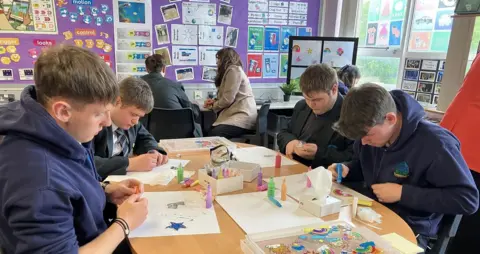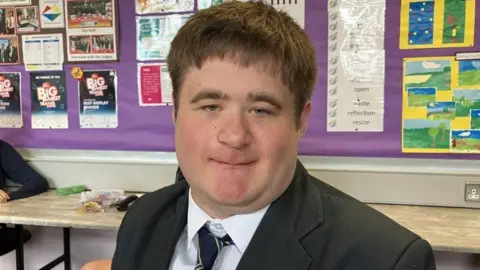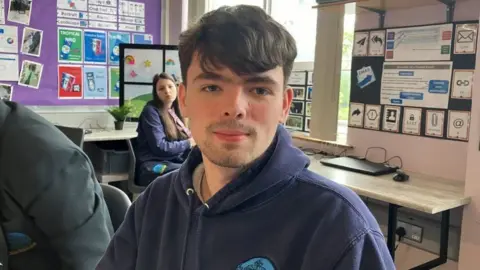[ad_1]
By Robbie Meredith, BBC NI Education and Arts Correspondent
 BBC
BBCMove over Lord Sugar and the apprentices, 18-year-old Joshua and his class at Park Special School in Belfast are after your business.
Joshua and other pupils have an award-winning company of their own.
The company, called Spectrum, was set up by Park School pupils to manufacture and sell suncatchers.
But while the pupils have learned so much, their teachers fear a lack of pathways post-19 will leave them with few opportunities.
That is because there are no laws in Northern Ireland which set a pathway for young people with Special Educational Needs (SEN) when they leave school.
It is a situation the principal of Park School, Bernie Davis, said needs to change.
Spectrum was awarded the team of the year prize at the Northern Ireland Young Enterprise Awards for their suncatchers work.
Suncatchers have been described as “visual wind chimes” and are popular ornaments.
They are pieces of stained glass craft hung in or near a window to collect the daylight, often in the shape of things like butterflies or rainbows.
Celebrations planned

Joshua took part in manufacturing and marketing the suncatchers.
“The best thing about it was painting, it’s very relaxing for me,” he told BBC News NI.
“I like to draw myself and it doesn’t take a lot of time for me as I’m very quick at what I do.”
The pupils were presented with their award at a ceremony at Belfast City Hall, and Joshua said they have more celebrations planned before the end of the school year.
“We got to go to City Hall, that we were very happy about,” he said.
“We’re planning to go on trips and stuff with our profit.”
Nineteen-year-old Joseph took on the job of managing director of Spectrum and learned some important lessons.
“In a business, if you have a lot of individuals around you, the most important thing you need is to work together with efficiency included,” he said.
“If I were to go and run a business myself, I’d probably run something similar to start off – something small.
“And then if I were to expand in business, maybe look to other products that might profit more and be more eye-catching to customers.”

Their teacher, Jillian West, said making the suncatchers was very “labour intensive”.
“Every Tuesday they also had a board meeting and students then would discuss what they were going to plan and do that day,” she said.
“A lot of market research went into it and also a lot of actual marketing – making adverts, using the green-screen.”
She said the students had learned “loads of life skills”.
“Their communication is probably key, they’ve gone out and actually talked to members of the public, the judges at the trade fair, the confidence that they got from that,” she said.
‘Lack of options’ for SEN pupils after school
Like Jillian West, principal Bernie Davis is “super proud” of her students and the business skills they have shown.
But she fears for their future careers when they leave school.
Unlike many of their peers, they can face a “cliff-edge” with no straightforward routes into further education, training or work.
“Unfortunately with the lack of pathways and options for our children – SEN pupils leaving school at post-19 – the opportunities are not there,” she said.

“In England they have a children and family act and that enables pathways to be put in place for the SEN children leaving.
“Unfortunately here there’s no legislation and it’s something I would love to see.
“Once the children come to 19 their statement stops and they’re left, unfortunately.
“The life skills, the confidence and the self-esteem the children have attained from being part of the Young Enterprise programme, I would hate to see that that would be lost.
“Obviously they’re forgotten about in society, and they have a lot to give to society and it’s a shame to see them left like this.”

For 17-year-old Clarke, the best part of being in the company was “being with my friends, hard work, and just making sure everything was right and making sure it all goes to plan”.
And like the other pupils, he now has business ambitions for the future.
“I would like to do work with people in business like working in shops, or, you know, retail or arts and crafts and stuff, because it’s good,” Clarke said.
“You have new friends and you’re working with people that love doing the same thing as what you like to do.”
Joshua has similar goals.
“I’m probably going to put myself out there and see what’s out there in the world,” he said.
“I may even start my own business maybe in the future.”
[ad_2]
Source link freeslots dinogame telegram营销




